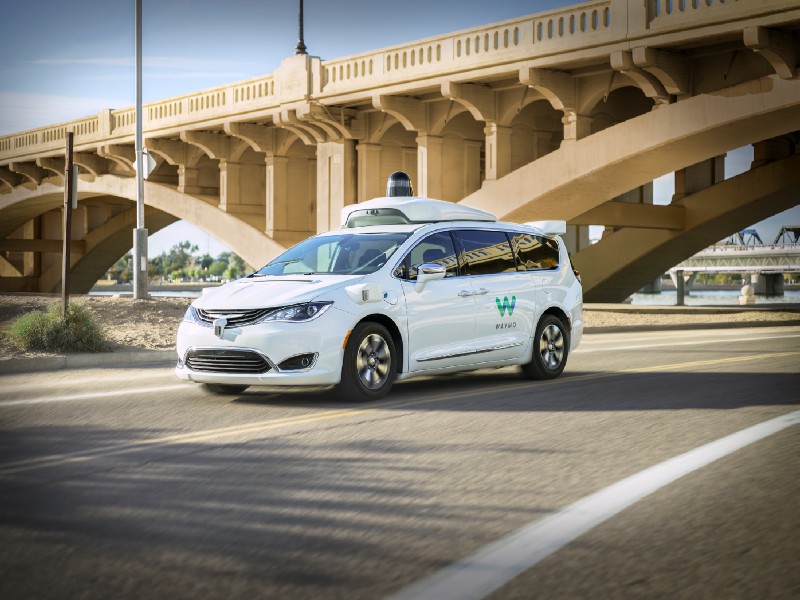 EMERGING TECH
EMERGING TECH
 EMERGING TECH
EMERGING TECH
 EMERGING TECH
EMERGING TECH
Alphabet Inc.’s Waymo LLC unit today disclosed that it has raised $2.5 billion in funding from its parent company and a dozen outside investors to continue its efforts to deploy autonomous vehicles on public roads.
The round brings the total amount of venture capital Waymo has received over the last two years to more than $5 billion. That doesn’t include what parent Alphabet spent to finance the unit’s operations, which started out as an internal Google project more than a decade ago.
Google launched its autonomous vehicle development efforts in 2009 with a small team of engineers from its X research lab. The initiative initially operated under the codename Project Chauffeur and was spun off seven years later into the standalone business that would become Waymo.
With another $2.5 billion on the books, Waymo can now expand not only its autonomous vehicle engineering operations but also its commercialization effort, which encompasses projects such as partnerships with automakers. The unit requires such significant amounts of capital because it’s pursuing multiple, technically ambitious initiatives across several different areas.
Waymo is building cutting-edge artificial intelligence software to help its autonomous vehicles navigate public roads. The Alphabet unit not only creates the algorithms but also trains them. Waymo maintains multiple private test tracks where its AI-powered vehicles learn skills such as avoiding obstacles and operates a sophisticated, cloud-based vehicle simulation environment. Waymo’s AI navigation system has covered tens of billions of virtual miles in simulated training runs.
The unit also develops its own hardware, another capital-intensive endeavor that the new funding round will help support. Waymo has designed multiple generations of lidar sensors and radar devices in-house. In addition, the unit makes auxiliary components such as cleaning mechanisms that prevent debris from inferring with sensors, plus vehicle-specific systems such as motion controls to help autonomous trucks make turns more smoothly.
Waymo’s commercialization activities are equally broad in focus. The company operates an autonomous taxi service, and, at the same time, is working with automakers to build self-driving trucks.
The size of Waymo’s latest funding round raises the possibility that it may be preparing to expand availability of its autonomous taxi service to more areas. Expanding to a new region comes with significant costs for Waymo: It has to create a highly detailed map of the area to help its autonomous vehicles navigate reliability, which requires meticulously recording every stop sign, lane marking and sidewalk. Waymo also needs to take on the cost of running local maintenance hubs to help support its vehicle fleets.
The extra $2.5 billion could give Waymo resources to extend the scale of any expansion effort it may be pursuing.
In parallel with the push to scale its autonomous taxi service, Waymo is targeting the nascent market for self-driving trucks. The Alphabet unit is taking advantage of the fact that the AI and sensor technologies it had built for its taxis can be applied to larger commercial vehicles as well, albeit with certain modifications. Trucks take longer to brake than passenger cars and have trailers that can move semi-independently, which requires their sensors to detect potential obstacles from longer distances.
This part of Waymo’s business may emerge as a particularly major focus going forward. That’s because autonomous trucks provide a potentially faster path to commercialization than autonomous taxis. Some commercial trucks operate primarily in areas with limited traffic, such as the private roads connecting buildings on a factory campus, which makes navigation easier for the onboard AI and thereby simplifies software development.
Waymo is facing increasing competition in the autonomous vehicle market. One of its top rivals is General Motors Co.’s Cruise unit, which has likewise raised billions of dollars in funding from outside investors. Cruise this week secured $5 billion credit line from parent GM to support the upcoming rollout of its Origin autonomous shuttles, which have no steering brake or pedals.
Intel Corp.’s Mobileye unit is another potential Waymo rival. The unit, which makes chips for driver assistance systems that automate tasks such as parking, is building technologies to eventually enable fully autonomous driving.
Both Mobileye and Cruise have significant competitive strengths. Mobileye maintains extensive partnerships with automakers that have helped it amass a considerable amount of mapping data to support autonomous vehicle navigation, while Cruise has access to the auto manufacturing infrastructure and know-how of parent GM, which produces its Origin shuttles.
THANK YOU